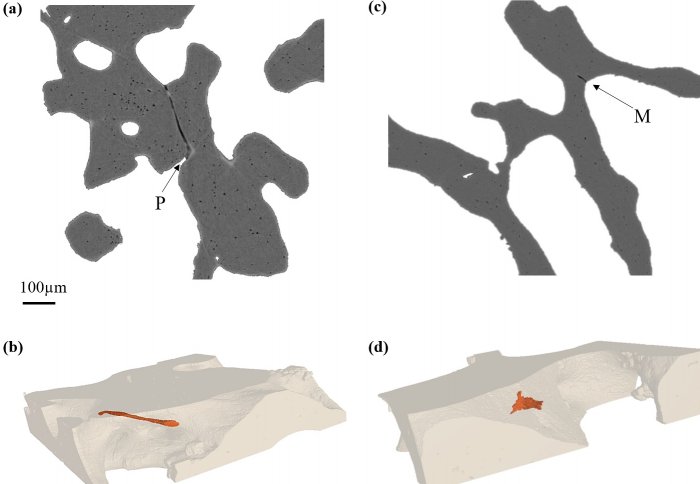Mech Eng researchers investigate effects of treatment for weak bones

Engineering and medical researchers at Imperial collaborated on a groundbreaking study on the long-term effects of osteoporosis drugs.
The early-stage research, published in Nature Scientific Reports earlier this month, suggests that bisphosphonates, a type of drug used to treat weak bones, may be associated with an increased risk of micro-cracks in the bone.
The work is a collaboration between the Department of Mechanical Engineering and the Department of Surgery and Cancer. PhD student Shaocheng Ma from the Biomechanics group, supervised by Dr Ulrich Hansen (Mechanical Engineering) and Dr Richard Abel (Surgery and Cancer), is the first credited author of the paper. Recent PhD graduate Andi Jin, also from the Mechanical Engineering department, is a co-author.
The researchers studied bone samples from 16 hip replacement patients diagnosed with osteoporosis, a condition that makes bone more fragile and prone to breaking. They found that samples from patients who had been treated with bisphosphonates had more micro-cracks and reduced mechanical strength, compared to those who had not received the drug.
Dr Ulrich Hansen explains: “The study showed that the strength of the bone from patients treated with the drug was reduced relative to the bone from untreated patients, and that this was associated with an increased level of pre-existing micro-cracks. As the drug is taken by millions of people to prevent fracture, this has obvious implications and is indeed very controversial. It must be emphasized that the study was small and it has to be interpreted in the context of the limitations of the work as well as other work that has shown very strong evidence that the drug is effective in reducing bone fractures, at least in the short to medium term.
A possible interpretation (and extrapolation) may be that the drug increases the mass of bone, but over time turns the bone into a more brittle, albeit denser, material. Another interpretation of the study may be that the drug works for most patients, but not for all. What does seem clear is that we owe it to the millions of patients taking this drug to improve our understanding, so that the best possible treatment and guidance can be provided, and with as much confidence as possible.”
More research is needed to follow up on the findings of the study, which highlight the importance of analysing the long-term effects of established drugs. Several media outlets have featured the story since the study was released, including The Guardian and BBC Radio 4.
Article text (excluding photos or graphics) © Imperial College London.
Photos and graphics subject to third party copyright used with permission or © Imperial College London.
Reporter
Press Office
Communications and Public Affairs
- Email: press.office@imperial.ac.uk
